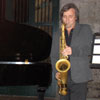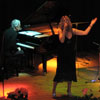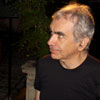 |
 |
Projects
| ARRIGO CAPPELLETTI - GIULIO MARTINO DUO | |||
| ARRIGO CAPPELLETTI MEETS FADO | |||
| ARRIGO CAPPELLETTI TRIO | |||
| CAPPELLETTI-VISIBELLI DUO | |||
| NEI DINTORNI DEL FADO (Around Fado) | |||
| ARRIGO CAPPELLETTI-RALPH ALESSI | |||
| ARRIGO CAPPELLETTI PLAYS MONK | |||
| METAMORPHOSIS PROJECT feat. MAT MANERI | |||
|
|||
| SEMINARS AND WORKSHOPS |
| ARRIGO CAPPELLETTI MEETS FADO | |||
|---|---|---|---|
Arrigo Cappelletti piano
|
During his Portuguese experience Arrigo Cappelletti not only introduced a kind of jazz mixed to sonorities and atmospheres of fado, but composed true traditional fados, too, committing their interpretation to some of the most famous representatives of Portuguese fado, as Ana Moura, Jorge Fernando and Custodio Castelo. The result is a show where Cappelletti’s compositions stand side-by-side with some of most famous fados, without losing atmospheres and quality of interpretation. The classic trio of fado (voice, viola/guitar and Portuguese guitar) joined by Cappelletti playing piano gives a result of rhythmic complexity and dialogue between piano and Portuguese guitar, unknown to traditional executions. |
||
| ARRIGO CAPPELLETTI TRIO | |||||||
|---|---|---|---|---|---|---|---|
Arrigo Cappelletti
piano
|
After several years of musical research, during which he worked with no frontiers (Tango-Jazz with Coscia and Manoury; Portuguese Fado with Alexandra, Custódio Castelo, Jorge Fernando; musical compositions inspired by the biggest poets of 20th Century; recent experimentation with Giulio Visibelli as a Duo), with some concerts in 2004 (Blue Note in Milan; “Classico” and Palma Theater in Rome; Ecojazz Festival in Reggio Calabria) and with the CD Arrigo Cappelletti Trio in New York (recorded in August 2005 in NY and just published by Music Center), Arrigo Cappelletti is back to his first love: the classic Trio with piano. Since the 1992 album Singolari Equilibri (Peculiar Balances), with Haemi Haemmerli and Bill Elgart, sythesis of lyrical and research, explicitly influenced by Paul Bley and remarked on Penguin Guide to Jazz as one of the most important Trio CDs of the last years, his plays in a Trio were more and more unfrequent. Now Cappelletti presents his Trio with two big personalities of the NY Jazz avant-garde: double bass player John Hebert and drummer Jeff Hirshfield. His program is one one side inspired by lyricism, rarefation and irony of Paul Bley (on whom in the meanwhile he wrote the book Paul Bley, la logica del caso), on the other side related to the fundamental lesson of blues and standards. |
||||||
| DUO CAPPELLETTI-VISIBELLI | |||||
|---|---|---|---|---|---|
Arrigo Cappelletti
piano
|
A surprising, lyric, mocking bet: the meeting of Tango
and freely improvised Jazz, on Arrigo Cappelletti’s compositions.
Promoters are Cappelletti and Visibelli, who worked together since
the album Pianure, first Italian experiment of Tango-Jazz,
towards musical research with no fronteers. “Questa musica gode di una libertà che non è
mai alea, muovendosi con quel limpido procedere, sobrio ed essenziale,
che è connaturato al modo di esprimersi di entrambi i musicisti.
E quanto al tango, raramente è presente in modo esplicito;
viene più che altro evocato attraverso uno sguardo al suo
mondo espressivo, la cui componente lirico-malinconica tocca corde
alle quali i due musicisti (soprattutto Cappelletti) sono molto
sensibili: Si può allora dire che ci troviamo di fronte ad
una riflessione sul clima emotivo del tango, fatta usando le parole
e la sintassi del jazz” |
||||
| NEI DINTORNI DEL FADO (Around Fado) | |||||||||
|---|---|---|---|---|---|---|---|---|---|
| Maria Antonazzo voice Marcella Schiavelli cello Umberto Pedraglio cello Arrigo Cappelletti pianoforte and composition
|
An instrumental support very close to silence – two cellos
and one lone piano – and, at the counter-side, a strong incisive
voice – Maria Antonazzo, grown in popular French repertory:
from here Arrigo Cappelletti leads his way in a known but nonetheless
surprising experience. He physically and culturally dealt with Portugal for a long time, creating as a result the album “Terras do risco” (published by Amiata-EMI), a peculiar mix of Fado and Jazz. Now he gets back there, without being there, following the Fado resonance as a shadow lengthening on other streets. So we have lyrics in Portuguese by Fernando Pessoa, Sophia de Mello Andresen, Camilo Pessanha, Teresa Lopez and Mário de Andrade together with other ones, linked to different languages, different poetic worlds: one name above others, Nina Berberova. They are very feminine lyrics, not only because written chiefly by women: their coherence is a general climate of moon and lightness, sensuality and elsewhere, irony and freedom. Something unshaped and a bit secret, hanging between physicality and interiority in an existentialist way, but without existentialist anguish: poetry, in the distance of space and time, finds home. Cappelletti curiously reflects himself in this very strange matter that involves him. Omnivorous reader and educated composer, links the lyrics to the most different musical references – Tango, Folk, historical 20th Century Avant-Garde. Uneasy piano player, jazz man in the deep of his soul, surprises his own writing by the continue challenging of improvisation. But besides his caprice, he invites us to explore the unseen, in a world kneeled at visibility’s feet. To be, not-to-be, voilà la question. And it’s still not easy. Mara Cantoni (unrevised translation) |
||||||||
| ARRIGO CAPPELLETTI-RALPH ALESSI | |||||
|---|---|---|---|---|---|
Arrigo Cappelletti
piano
|
This Duo has its beginning during a tour in Summer 2005.
Arrigo Cappelletti works with American trumpetist Ralph Alessi,
important personality of NY Jazz avant-garde, for a project on free
improvisation. An open, lyric music, full of surprises and links
not only to Jazz but to 20th Century music as well. In his book
on Paul Bley, Arrigo Cappelletti writes: |
||||
| ARRIGO CAPPELLETTI PLAYS MONK | |||
|---|---|---|---|
Arrigo Cappelletti piano
|
Arrigo Cappelletti is one of the many jazz pianists to try their hand on piano solo with the music of Thelonious Monk. However, his approach to the music of Monk stands out for its unconventional nature and at the same time rigorous. There is nothing here of the 'wandering' free and rhapsodic of many experiments in piano solos. Monk's compositions are dismantled and rebuilt in a free and all are, at least initially, unrecognizable. But Cappelletti remains faithful to their core audience and, above all, the 'spirit' of the music of Monk. A famous songs such as “Ask Me Now”, “Pannonica”, “Crepuscule With Nellie”, “Ruby My Dear”, “I mean You”, “Monk’s Mood” etc ... join in the project compositions directly inspired by Cappelletti Monk as "Breaks", "Tanghedia", "For Andrea", "Durate". |
||
| METAMORPHOSIS PROJECT feat.MAT MANERI | |||
|---|---|---|---|
Arrigo Cappelletti pianoforte
|
Courageous and innovative, this quartet presents a lyric, open and adventurous free jazz in which you can find everything: from Mahler to Satie and Bill Evans, from tango to electronic music, from blues to unconventional kinds such as Carla Bley’s, Jimi Hendrix’ and Thelonius Monk’s. Their music is not superimposed and ‘quoted’ but ‘filtered’, transformed, metabolized during collective improvisation and it is experienced like a process of constant change and metamorphosis. In this search towards tonality, viola player Matt Maneri, one of the greatest free jazzmen, plays a fundamental role. Member of the Boston Microtonal Society, he played with Cecil Taylor, Paul Motian, Matthew Shipp and Joe Morris. Tonality wise, his restlessness and ambiguity evoke rather than quote the lyricism of tango and the ‘blues’ of the blues. Pianist Arrigo Cappelletti plays an equally important role, being the author of most of the themes and being the one who inspired the first tango-jazz group in Italy at the end of the eighties. Together with guitarist Andrea Massaria, who, with the filtered and enigmatic sound of his guitar, makes up for Cappelletti’s and Maneri’s lyricism with moderation and class. Drummer Nicola Stranieri balances everything with great care and taste. | ||











